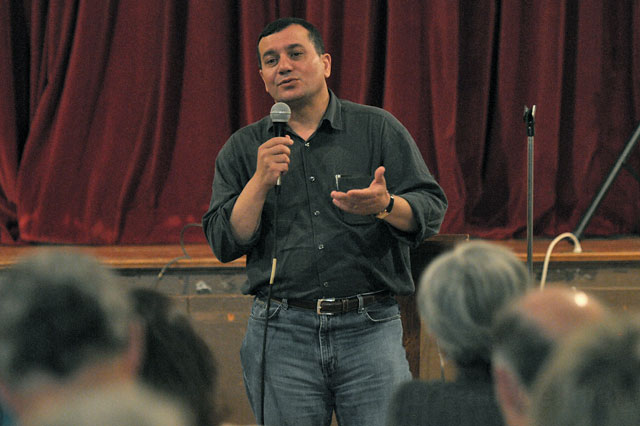Beautiful Resistance: A Call to Arts
Dr. Abdelfattah Abusrour Says the Kids Deserve Better

“Each of us is a change-maker,” said Dr. Abdelfattah Abusrour to a 60-person crowd at Trinity Episcopal Church last Tuesday night. “Nobody is born with genes of hatred or violence. We are human beings.”
Sponsored by Jewish Voice for Peace and Unitarian Universalists for Justice in the Middle East,
Abusrour’s lecture served as a call to arts. In his first visit to Santa Barbara, Abusrour — the founder of the Al-Rowwad Cultural and Theatre Training Center in the West Bank’s Aida Refugee Camp — wanted to make one thing clear amid all the blurriness of the Israel-Palestine conflict: the kids deserve better.
“We want to help each other create a better world for our children,” he said. “No parents in this world want to walk at the funerals of their children.”
In 1998, on a mission to stop that from happening, Abusrour opened the center, a place that he says is dedicated to a “beautiful resistance.” Promoting peace, the center — which calls itself “non-political” and “non-governmental” — provides the kids in the camp with the opportunity to immerse themselves in the arts rather than the violence they may be accustomed to. “Beautiful resistance,” he said, is “a way to give our children the possibility to be truthful, to narrate their own versions of their history, to build peace within before making peace with others.”
Born in 1963, in a refugee camp himself, Abusrour called his status as an “Arab-Muslim-Palestinian” a “dynamic” — albeit misunderstood — “trio.” One time, he recalled, while sitting on a subway, a woman complained about sitting next to a “terrorist.” He chalked that incident up to a lack of information. “People are ignorant,” he said.
Prior to opening Al-Rowwad, Abusrour worked as a professor and a medical engineer. But the idea of working with children — working to make their lives better — called to him.
Over two-thirds of the refugees at the Aida camp, as noted in a brief video shown to the lecture’s attendees, are under the age of 18. While violence is not foreign to them, neither is peace, said Abusrour — thanks to the center.
Since its inception, Al-Rowwad has provided the kids with a variety of ways to bring about non-violent change. In addition to being taught how to snap photos and take videos, the kids at the center are encouraged to act, dance, sing, and play. Notable achievements, Dr. Abusrour said, have included the center’s all-girls football team and its traveling dance team, which has performed not only in the West Bank but also in the United States and some European countries. Those activities, he said, provide “hope in such times of despair.”
And in not only teaching the children at the center but also in having the children spread their peaceful message across the globe, said Dr. Abusrour, there comes “a way to create this opportunity for everybody, a change that we can be proud of, a way to say that we share the same values. This is our sense of humanity.”
Margo Chapman, a member not of Trinity Episcopal Church but of First Congregational Church, was motivated to come to the lecture by a desire for a deeper perspective. “I hope to learn more about what’s actually happening to the Palestinians and their area and why,” she said. “Things are not always good for them.”
That’s true, but that doesn’t mean they can’t be, said Abusrour, cautioning people against the binary of “oppressed against oppressor.”
“For me,” he said, “it’s essential that everyone feels responsible. It’s important for us to look at each other as potential partners not potential enemies.”
For more information, visit http://www.alrowwadusa.org.



